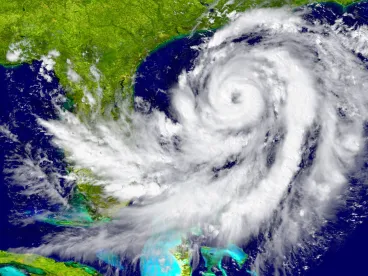We’ve all seen the horrific images of wasted buildings and landscapes after a disaster has hit. Despair and hopelessness may be the first thing that comes to mind. But it doesn’t have to be. With foresight and careful planning, understanding the Rules of Professional Conduct in regards to the American Bar Association, some of the most critical damage can be mitigated, such as your client’s files and property, your files and property as well as your firm’s continuity.
What about ethics and liabilities for lost, damaged or destroyed client property? Is it possible that a law firm that has suffered such a destructive catastrophe could then be held liable for the loss? Could the law firm be answerable to ethics charges? In a word, yes. At least according to a Florida Bar article Law Office Disaster Preparedness: The Liability and Ethics of Attorneys by James Keim.
Keim sets forth several points regarding Florida law and centers his arguments around hurricanes, which are frequent catastrophic Florida events. No matter where you are, however, a disaster of one sort or another can strike with no warning or only a few days warning. It behooves you to think about damages both physical as well as legal.
A law firm is unique among businesses in that, “law firms and their lawyers have greater obligations to their clientele. They have professional, ethical, fiduciary, and legal duties to protect, safeguard, and preserve client funds, interests, and property,” writes Keim.
Florida Rules of Professional Conduct
The article lists three Florida Rules of Professional Conduct. Most states have adopted similar entries in their rules.
Rule 4-1.15. Safekeeping property: “A lawyer shall comply with The Florida Bar Rules Regulating Trust Accounts.”
Rule 4-1.16(d). Protection of Client’s Interest: “Upon termination of representation, a lawyer shall take steps to the extent reasonably practicable to protect a client’s interest, such as giving reasonable notice to the client, allowing time for employment of other counsel, surrendering papers and property to which the client is entitled….”
Rule 5-1.1(a). Trust Accounts: “A lawyer shall hold in trust, separate from the lawyer’s own property, funds and property of clients or third persons that are in a lawyer’s possession in connection with a representation.”
These rules lay out an attorneys’ duty to his or her clients to preserve property and interests without making an exception because of a disaster.
The next question is to what extent does a lawyer need to go to preserve a client’s interests? Merely doing what he or she would to protect property does not go far enough, according to Kiem. He cites a Comment to Florida Rule 5-1.1. “A lawyer must hold property of others with the care required of a professional fiduciary.”
Kiem also offers State ex rel. The Florida Bar v. Ruskin, 126 So. 2d 142, 143 (Fla. 1961) to bolster his argument. The Supreme Court of Florida wrote, “[i]n handling his client’s money the lawyer should guard it with much greater diligence and caution than he does his own.”
What about civil liability?
Is a lawyer responsible for not preparing and protecting client property? DiGiulio v. Prudential Prop. & Cas. Ins. Co., 710 So. 2d 3, 4 (Fla. 4th D.C.A. 1998) indicates that it is part of Florida jurisprudence that there is a cause of action for spoliation of evidence. 13 Behr v. Foreman, 824 So. 2d 222 (Fla. 2d D.C.A. 2002) held that “whether the loss of property under the supervision of the attorney was foreseeable constituted a genuine issue of material fact which precluded summary judgment,” writes Kiem.
Claims of breach of fiduciary duty often go hand in hand with claims of negligence in claims of legal malpractice. Attorneys are legally explicit fiduciaries because of the attorney-client relationship. Kiem writes that a client entrusts his property to an attorney and fully expects that attorney to keep care over the property “in trust and in reliance on the attorney to take every reasonable step to provide the protection, accounting, and safekeeping customarily provided by other professional fiduciaries.”
Kiem argues that with advanced technologies the public is clearly warned of impending hurricane disasters and as such should take reasonable steps to safeguard a clients property and interests.
Spoliation of evidence is another path that a claimant may take. In Florida, it is not necessary to show that but for evidence being destroyed a client would have won a claim.
Must-Ask Disaster Questions
As Kiem points out, short of hiring a U-Haul and loading up everything, what are reasonable steps an attorney might take to avoid liability and ethics claims? In the case of Florida and it’s frequent and unwanted role as host to hurricane landfalls, Kiem lists 12 considerations. Most of the items may be applied to any part of the nation regarding any type of disaster.
- Was the building in which the law office is located constructed or updated to meet or exceed the standards set forth under post-Hurricane Andrew code?
- Does the physical structure allow for the addition of hurricane shutters, protective hurricane film, and other barriers to wind and rain not currently in place?
- Is the law firm located within a flood zone or area prone to flooding?
- What category of the hurricane (or type of other disasters) would it take to cause total devastation to the office and its contents?
- Can the law firm feasibly move the law office to a safer, more secure location as an alternative to improving the physical structure?
- In what manner can the firm best protect client property in the possession of the law firm in the event a disaster strikes?
- Does the law firm possess a means to back-up and preserve client case information in the event the client’s physical file is lost or destroyed?
- Has the law firm considered temporary relocation areas, g., a satellite office or another location, so that it may carry on firm business after a catastrophe occurs?
- Does the law firm possess a plan for the removal of computer hardware or an arrangement for the use of other equipment if office machinery is destroyed? How will the firm gain access to saved data after the storm passes?
- How will the law firm track important deadlines and appointments if a disaster destroys everything onsite?
- Did the law firm act according to all resources provided by the American Bar Association, such as the Model Rules of Professional Conduct?
- Does “going paperless” make sense for our firm?
- Are the law firm and its attorneys adequately insured?
Conclusion
The lesson is don’t be surprised by a catastrophic disaster. Be as prepared as possible. Lives are the most important areas of concern, followed by property and continuity of your law firm. A large portion of ensuring the continuity of your firm means paying attention to the Model Rules of Professional Conduct, your liabilities, and ethical duties to your clients regarding funds, property, and interests.




 />i
/>i

